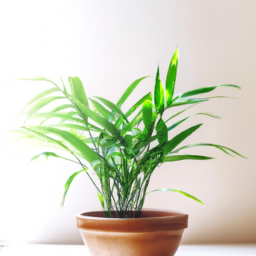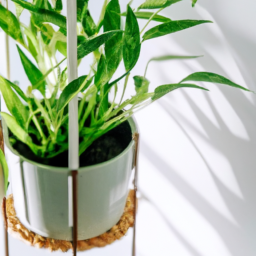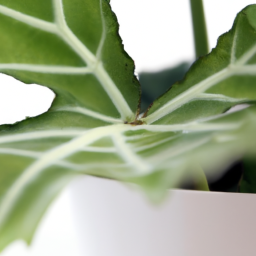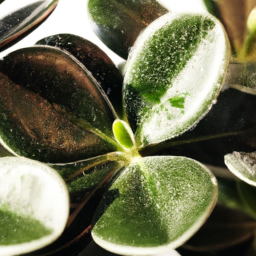
Have you ever thought about how indoor plants can actually help purify the air in your home? It’s true – indoor plants purify air by absorbing harmful pollutants and releasing oxygen. Not only do they add a touch of greenery to your space, but they can also improve the air quality in your home. In this blog post, we’ll explore the benefits of having indoor plants and how they can help create a healthier environment for you and your family. So, let’s dive in and discover the amazing ways that indoor plants can purify the air in your home.
Benefits of Indoor Plants for Air Purification
Introduction
Indoor plants are not just a beautiful addition to your home decor, they also play a crucial role in purifying the air you breathe. In today’s world, where air pollution is a major concern, having indoor plants can significantly improve the air quality in your living space. These plants not only add a touch of greenery to your home but also act as natural air purifiers, removing harmful toxins and pollutants from the air. In this article, we will explore the numerous benefits of indoor plants for air purification and how you can effectively use them to create a healthier indoor environment.
How Indoor Plants Purify Air
Indoor plants have the remarkable ability to absorb pollutants and toxins from the air through a process called phytoremediation. This process involves the plants taking in harmful gases such as benzene, formaldehyde, and trichloroethylene through their leaves and roots, and converting them into oxygen. Plants also release moisture vapor during transpiration, which helps to increase humidity levels in the air and reduce airborne dust particles. Some of the best air-purifying plants include spider plants, peace lilies, snake plants, and pothos, which are known for their ability to filter out common indoor pollutants.
In addition to removing toxins from the air, indoor plants also have a calming effect on the mind and body, reducing stress and anxiety levels. Studies have shown that being around plants can help improve concentration, productivity, and overall well-being. By incorporating indoor plants into your living space, you can create a healthier and more relaxing environment for yourself and your family.
Indoor plants not only purify the air but also add beauty and aesthetic appeal to your home. With a wide variety of plant species to choose from, you can create a green oasis in any room of your house. Whether you prefer hanging plants, succulents, or flowering plants, there is a plant for every style and preference. By strategically placing plants in different areas of your home, you can enhance the overall ambiance and create a more inviting and welcoming atmosphere.
Tips for Using Indoor Plants for Air Purification
To maximize the air-purifying benefits of indoor plants, it is important to choose the right plants for your space and care for them properly. Start by selecting plants that are known for their air-purifying properties, such as aloe vera, bamboo palm, or rubber plant. These plants are easy to care for and can thrive in a variety of indoor environments. Place your plants in well-lit areas with indirect sunlight and water them regularly to keep the soil moist but not waterlogged.
In addition to choosing the right plants, consider grouping plants together to create a mini indoor garden. This not only enhances the visual appeal of your space but also increases the overall air-purifying effect. Mix and match different plant species to create a diverse and balanced indoor ecosystem. Remember to dust the leaves of your plants regularly to ensure optimal air purification and growth.
Lastly, be mindful of the air quality in your home and make adjustments as needed. Open windows and doors to allow fresh air to circulate, and avoid using harsh chemicals or cleaning products that can release harmful fumes into the air. By incorporating indoor plants into your home and following these simple tips, you can enjoy cleaner, fresher air and a healthier living environment for you and your loved ones.
In conclusion, indoor plants are a natural and effective way to purify the air in your home. By harnessing the power of plants to filter out toxins and pollutants, you can create a healthier and more sustainable indoor environment. With the right plants and proper care, you can enjoy the numerous benefits of indoor plants for air purification and live in a space that is not only beautiful but also clean and fresh. So go ahead, bring some greenery into your home and breathe easier knowing that your indoor plants are working hard to keep the air you breathe pure and healthy.

Best Indoor Plants for Improving Air Quality
Introduction
When it comes to improving the air quality in your home, indoor plants can be a great natural solution. Not only do they add a touch of greenery to your space, but they also help to purify the air by absorbing toxins and releasing oxygen. In this guide, we will explore some of the best indoor plants for improving air quality and how to care for them.
Snake Plant
The snake plant, also known as mother-in-law’s tongue, is a popular choice for indoor spaces because of its low maintenance requirements and air-purifying qualities. This plant is able to filter out formaldehyde, benzene, xylene, and trichloroethylene from the air, making it a great addition to any room. Snake plants are also known for their ability to release oxygen at night, making them a perfect choice for bedrooms.
To care for a snake plant, place it in indirect sunlight and water it sparingly, allowing the soil to dry out between waterings. These plants are very resilient and can thrive in a variety of conditions, making them ideal for beginners or those with busy schedules.
Another benefit of snake plants is that they are known to improve indoor humidity levels, which can help to reduce respiratory issues and dry skin. Overall, the snake plant is a versatile and effective option for improving air quality in your home.
Spider Plant
The spider plant is another popular choice for indoor spaces, thanks to its easy care requirements and air-purifying abilities. This plant is known for its ability to remove formaldehyde, xylene, and carbon monoxide from the air, making it a great choice for homes with poor ventilation or high levels of pollutants.
Spider plants are also known for their ability to produce oxygen and reduce indoor humidity levels, making them a great choice for improving air quality in any room. To care for a spider plant, place it in indirect sunlight and water it regularly, allowing the soil to dry out between waterings.
One unique feature of spider plants is their ability to produce baby spider plants, or “spiderettes,” which can be easily propagated and grown into new plants. This makes spider plants a great option for those looking to expand their indoor plant collection or share with friends and family.
In conclusion, the spider plant is a versatile and effective option for improving air quality in your home, thanks to its air-purifying abilities and easy care requirements.
Peace Lily
The peace lily is a beautiful and popular choice for indoor spaces, thanks to its elegant white flowers and air-purifying qualities. This plant is known for its ability to remove toxins such as formaldehyde, benzene, trichloroethylene, and ammonia from the air, making it a great choice for homes with poor air quality.
Peace lilies are also known for their ability to produce oxygen and increase indoor humidity levels, making them a great choice for bedrooms or living spaces. To care for a peace lily, place it in indirect sunlight and water it regularly, allowing the soil to dry out slightly between waterings.
One thing to keep in mind when caring for a peace lily is that it is toxic to pets if ingested, so be sure to keep it out of reach of animals. Overall, the peace lily is a beautiful and effective option for improving air quality in your home, thanks to its air-purifying abilities and elegant appearance.
In conclusion, indoor plants can be a great natural solution for improving air quality in your home. By choosing plants such as the snake plant, spider plant, and peace lily, you can enjoy cleaner and fresher air while adding a touch of greenery to your space. Remember to care for your plants properly by providing them with the right amount of sunlight and water, and they will continue to purify the air and enhance your indoor environment.

Tips for Maintaining Indoor Plants that Purify Air
Choose the Right Plants
When it comes to selecting indoor plants that purify the air, it’s essential to choose the right ones for your space. Some popular options include peace lilies, spider plants, snake plants, and pothos. These plants are known for their ability to filter out toxins and improve air quality. Consider the size of your space and the amount of natural light it receives when selecting plants. Make sure to research each plant’s specific care requirements to ensure they thrive in your home.
Once you’ve chosen your plants, it’s crucial to place them strategically around your space. Consider placing plants in areas where you spend the most time, such as your living room or bedroom. Additionally, grouping plants together can create a more significant impact on air quality. Be mindful of any drafts or temperature fluctuations that could affect your plants’ health.
Regularly inspect your plants for any signs of pests or disease. Insects like spider mites and mealybugs can quickly infest indoor plants and damage their health. If you notice any issues, take immediate action to prevent further damage. Consider using natural pest control methods or seeking advice from a local nursery or plant expert.
Provide Adequate Care
Proper care is essential for maintaining indoor plants that purify the air. Make sure to water your plants regularly, but be mindful not to overwater them. Most indoor plants prefer to dry out slightly between waterings, so it’s essential to establish a consistent watering schedule. Consider using a moisture meter to determine when your plants need water.
In addition to watering, it’s crucial to provide your plants with adequate sunlight. Most indoor plants thrive in indirect sunlight, so be sure to place them near a window where they can receive natural light. If your space lacks natural light, consider supplementing with a grow light to ensure your plants receive the necessary light to thrive.
Fertilizing your plants is another essential aspect of care. Consider using a balanced, water-soluble fertilizer to provide your plants with the necessary nutrients to support growth and air purification. Be mindful of any specific fertilizer requirements for each plant species and adjust your fertilizing schedule accordingly.
Maintain a Clean Environment
In addition to providing proper care for your indoor plants, maintaining a clean environment is crucial for air purification. Dust and debris can accumulate on plant leaves, hindering their ability to filter toxins from the air. Regularly dusting your plants with a soft cloth or gently rinsing them under lukewarm water can help keep them clean and healthy.
Avoid using harsh chemicals or cleaning products near your plants, as these can be harmful to their health. Consider using natural cleaning solutions like a mixture of water and mild soap to clean plant leaves and pots. Additionally, keep an eye out for any mold or mildew growth around your plants, as these can negatively impact air quality.
Finally, maintaining proper humidity levels in your space can benefit both your plants and air quality. Indoor plants thrive in environments with moderate humidity levels, so consider using a humidifier to regulate moisture levels. Be mindful of any dry or humid conditions that could affect your plants’ health and adjust accordingly.
Summary Snapshot
Did you know that indoor plants do more than just add a touch of green to your living space? They can also help purify the air you breathe! Indoor plants have the amazing ability to filter out harmful toxins and pollutants, making your home a healthier place to be. By absorbing carbon dioxide and releasing oxygen, plants can improve air quality and create a more pleasant environment for you and your family.
Not only do indoor plants have air-purifying properties, but they also have a calming and soothing effect on our minds. Studies have shown that being surrounded by greenery can reduce stress, improve concentration, and boost overall well-being. So, next time you’re looking to freshen up your home decor, consider adding some indoor plants to not only beautify your space but also to promote a healthier and happier lifestyle.
Here are this week’s Top Questions and Answers
Q1: How do indoor plants purify the air?
A1: Indoor plants purify the air through a process called photosynthesis, where they absorb carbon dioxide and release oxygen. They also absorb toxins like formaldehyde and benzene through their leaves and roots, improving air quality.
Q2: Which indoor plants are best for purifying air?
A2: Some of the best indoor plants for purifying air include spider plants, pothos, peace lilies, snake plants, and rubber plants. These plants are known for their air-purifying properties and are easy to care for.
Q3: How many indoor plants do I need to purify the air in my home?
A3: The number of indoor plants needed to effectively purify the air in your home depends on the size of the space and the types of plants you choose. In general, it is recommended to have at least one plant per 100 square feet of space.
Q4: Do indoor plants require special care to purify the air?
A4: While indoor plants do not require special care to purify the air, it is important to provide them with the right amount of light, water, and nutrients to ensure they are healthy and thriving. Regularly dusting their leaves and checking for pests can also help maintain their air-purifying abilities.
Q5: Can indoor plants help reduce allergies and respiratory issues?
A5: Yes, indoor plants can help reduce allergies and respiratory issues by removing airborne pollutants and increasing humidity levels in the air. Plants like peace lilies and Boston ferns are known for their ability to reduce common allergens and improve air quality, making them beneficial for those with allergies or respiratory issues.
Dr. Olivia Green is a botanist with over two decades of experience in indoor plant cultivation. She holds a Ph.D. in Plant Biology and has dedicated her career to researching plant behavior in controlled environments. Dr. Green is passionate about helping plant enthusiasts master the art of indoor gardening through her extensive knowledge and practical insights.


